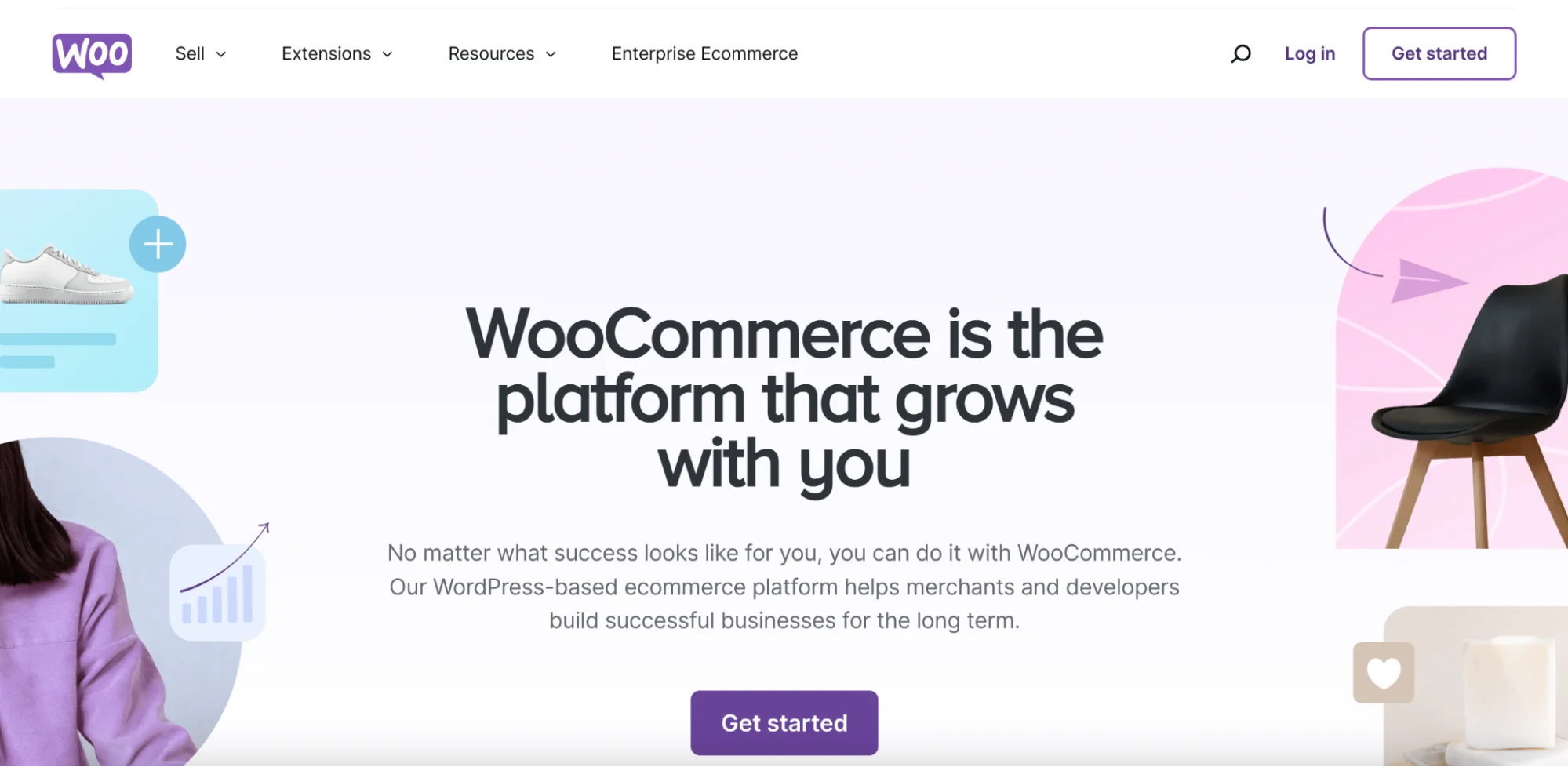As online sales surge, it’s projected that by 2026, nearly a quarter of all retail transactions will occur online. For small businesses, establishing a web store is essential. Thankfully, with the right tools, setting up an e-commerce platform has never been easier. Today, we’ll explore the top 5 ecommerce platforms to dominate, offering insights whether you’re DIY-ing or seeking a professional ecommerce development service. Let’s explore 5 best ecommerce platforms to launch web stores!

How to Choose the Best Ecommerce Platforms?
Navigating the sea of ecommerce website-building platforms can be daunting, especially for newcomers. Here are key factors to consider when selecting the ideal platform for your online store:
- Price: Begin with a modest budget and expand as your business flourishes. While free options may lack comprehensive features, explore lower-tier plans to gauge suitability without overspending. Ensure higher-tier plans align with your future needs.
- Feature Set: Assess essential features within your budget constraints. While most platforms offer fundamental capabilities, prioritize must-have functionalities (e.g., in-person selling) and work backward.
- User-Friendliness: Opt for platforms tailored to your proficiency level. Streamlined interfaces save time, particularly for less tech-savvy users, maximizing productivity.
- Support Infrastructure: Evaluate the platform’s support mechanisms for prompt issue resolution. If troubleshooting independently isn’t your forte, prioritize platforms with robust support features.
- Analytical Capabilities: Robust analytics are pivotal for informed decision-making as your business expands. Choose a platform with comprehensive reporting tools that facilitate confident analysis and actionable insights.
Let’s use these criteria to review the 5 most popular platforms for launching online stores.
5 Best Ecommerce Platforms
WooCommerce

When establishing your online store, WooCommerce stands out for its wide range of customizable themes and extensions. These provide the flexibility to align your store with your brand’s unique identity. Additionally, managing inventory, tracking sales, and handling shipping is a breeze with WooCommerce, offering a flexible and efficient approach.
The platform integrates with various payment gateways, prioritizing secure online customer transactions. WooCommerce offers extensive documentation and a supportive community, ensuring users receive assistance at every step of setting up their online store.
Price
WooCommerce is an open-source platform that is free to use, making it accessible to businesses of all sizes. However, while the base software is free, running a WooCommerce store does entail certain expenses.
Hosting packages for WooCommerce stores can vary significantly, ranging from under $5 to hundreds or thousands of dollars per month. Additionally, there are costs associated with essential tools, such as payment gateways and shipping options, and optional expenses, like paid WordPress themes, which typically range from $20 to $100 per year.
Feature Set
WooCommerce boasts a comprehensive feature set, providing users with a robust ecommerce solution. It offers extensive customization options, allowing businesses to tailor their online stores to suit their needs. With features like the ability to showcase featured products and a wide range of extensions available for further enhancing functionality, WooCommerce empowers businesses to create dynamic and engaging online experiences for their customers.
User-Friendliness
Renowned for its user-friendly interface, WooCommerce is designed to simplify setting up and managing an ecommerce store. WooCommerce offers an intuitive platform for seamlessly converting websites into fully functional online stores, even for those with limited coding skills. Its beginner-friendly approach ensures that users can quickly navigate the platform and make the most of its capabilities without encountering unnecessary complexity.
Support Infrastructure
WooCommerce provides a comprehensive support infrastructure to assist users at every stage of their ecommerce journey. This includes support for official WooCommerce extensions and themes and guidance for those seeking assistance from the wider WooCommerce community. While direct support is primarily offered to customers, non-customers can also access help through the WooCommerce Support Forum or by engaging the services of WooExpert agencies.
Analytical Capabilities
With the introduction of WooCommerce Analytics, businesses can access powerful reporting and data analysis tools for effectively managing their online stores. This feature offers nine new reports, advanced filtering and segmenting options, and the ability to download data in CSV format. Furthermore, WooCommerce Analytics seamlessly integrates with Google Analytics, providing businesses with comprehensive insights into key metrics and performance indicators to inform strategic decision-making and drive growth.
Shopify

When launching an online store, Shopify is one of the best ecommerce platforms to consider. Its user-friendly interface makes it easy for beginners to set up their online store. Additionally, Shopify provides a wide range of apps and integrations, allowing users to customize their store with various functionalities, which is perfect for tailoring the store to specific needs.
Moreover, with Shopify, users can easily manage their products, orders, and customer data through an intuitive dashboard, simplifying the day-to-day operations of an online store. On top of that, the platform supports multiple payment gateways, providing flexibility for customers to make purchases, which is essential for a smooth and convenient shopping experience.
Price
Shopify offers a selection of pricing plans tailored to suit various business requirements. The Basic Shopify plan starts at $29 per month, followed by the Shopify plan at $79 per month, and the Advanced Shopify plan at $299 per month. Additionally, Shopify accommodates larger enterprises with custom Enterprise plans tailored to individual online sales volumes.
Feature Set
Shopify delivers a comprehensive suite of features to optimize online stores. From establishing an online storefront to integrating a diverse range of apps to enhance functionality, Shopify equips businesses with tools to set featured products and more. Feature availability varies based on the selected plan.
User-Friendliness
Designed for accessibility, Shopify prioritizes ease of use for business users, minimizing reliance on developer support. Its intuitive control panel facilitates straightforward navigation, and for tasks beyond users’ expertise, Shopify boasts a vibrant community of experts ready to assist.
Support Infrastructure
Shopify provides robust support through multiple channels, including live chat, phone, and email. Additionally, users can access a comprehensive help center comprising user help documentation, learning guides, instructional videos, product updates, and community resources.
Analytical Capabilities
Shopify Analytics empowers businesses with tools to analyze visitor metrics, track order trends, and optimize marketing strategies. By leveraging Shopify Analytics, businesses gain insights to inform decision-making, enhance merchandising strategies, and maximize the effectiveness of their marketing campaigns.
BigCommerce

If you’re looking for an ecommerce platform that prioritizes user experience, BigCommerce is a top contender. Its user-friendly interface streamlines setting up and managing an online store, simplifying the often complex task of running an ecommerce business.
BigCommerce’s robust SEO tools also empower enterprises to enhance online visibility, attracting a more extensive customer base. The seamless integration with various payment gateways ensures a smooth and efficient checkout process, a crucial element for customer satisfaction. Moreover, the platform’s advanced marketing features, including abandoned cart savers and built-in product reviews, are geared towards boosting sales and fostering customer engagement, making it a comprehensive solution for ecommerce ventures.
Price
BigCommerce presents a range of pricing options to accommodate various business needs. Their Standard plan starts at $39 per month, followed by the Plus plan at $105 per month, and the Pro plan at $399 per month. The Pro plan’s pricing structure begins at $399 monthly for online sales under $400,000, with an additional $150 per month for every extra $200,000 in sales. Additionally, BigCommerce offers Enterprise plans tailored to individual businesses, with pricing based on their online sales volume.
Feature Set
BigCommerce offers a comprehensive suite of features designed to empower online stores. Included in their offerings are unlimited products, file storage, and bandwidth. Key features encompass single-page checkout, reduced downtime, coupon and gift certificate functionality, product videos, bulk pricing capabilities, ratings, and reviews, product swatches, customer groups and segmentation, abandoned cart recovery tools, and persistent cart functionality.
User-Friendliness
BigCommerce prioritizes accessibility for business users, aiming to minimize reliance on developer support. While its control panel may lack aesthetic appeal and entail a slight learning curve, its advanced features may pose challenges for newcomers. Nevertheless, BigCommerce strives to streamline the user experience for smoother navigation and utilization of its extensive capabilities.
Support Infrastructure
BigCommerce boasts a robust support infrastructure to help users navigate their ecommerce journey. Support channels include live chat, phone support, and email assistance. Additionally, BigCommerce offers a comprehensive help center featuring user help documentation, learning guides, informative videos, product updates, and access to community resources.
Analytical Capabilities
BigCommerce Analytics equips businesses with tools to track visitor metrics, discern order trends, shape merchandising strategies, and optimize marketing campaigns. With 11 eCommerce analytics reports, users gain insights into their store’s performance, facilitating informed decision-making and driving business growth.
Squarespace

Squarespace stands out for its visually stunning templates, which have the power to elevate the look of any ecommerce website. This platform offers users the effortless ability to customize their online store, ensuring that it authentically reflects their brand’s unique identity and style.
Furthermore, Squarespace provides seamless integration for ecommerce and content management, making it an all-in-one solution for businesses of all sizes. With its user-friendly interface, users can rely on Squarespace to efficiently and effectively manage their online store, streamlining the entire process.
Price
Squarespace offers a range of pricing plans, with monthly costs starting at $16 and going up to $65. The pricing structure is transparent, with no hidden fees or sudden increases upon renewal.
Feature Set
Squarespace delivers a comprehensive array of features for online stores, including award-winning templates and an intuitive site editor. With competitive pricing, Squarespace enables users to effortlessly add and organize images using a drag-and-drop builder, along with the ability to highlight featured products.
User-Friendliness
Renowned for its user-friendly interface, Squarespace provides an all-inclusive package with seamlessly integrated hosting and templates. Specifically designed for users without coding or development experience, Squarespace simplifies the process of building and managing an online store.
Support Infrastructure
Squarespace offers robust support through various channels, including live chat, phone, and email assistance. Users can also access a comprehensive help center containing user help documentation, learning guides, videos, product updates, and community resources.
Analytical Capabilities
Squarespace Analytics equips businesses with tools to analyze visitor metrics, track order trends, and optimize marketing strategies. With 11 ecommerce analytics reports, Squarespace provides insights into store performance, aiding businesses in making informed decisions and maximizing their online presence.
Conclusion
In conclusion, when it comes to launching web stores, the 5 best e-commerce platforms offer a range of features to cater to different business needs. From the user-friendly interface and wide range of apps and integrations of Shopify to the flexibility and seamless integration with WordPress of WooCommerce, each platform brings its unique strengths.
The choice of ecommerce platform will depend on each business’s specific requirements and goals. With the diverse options available, companies can find the perfect fit for their web store needs.







